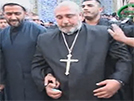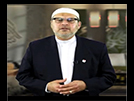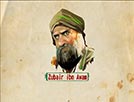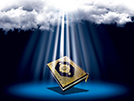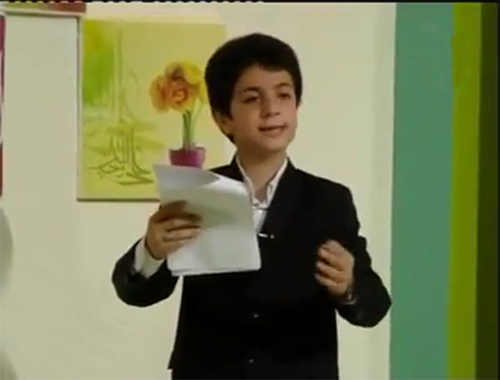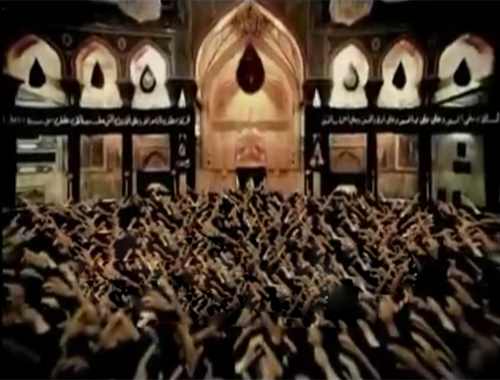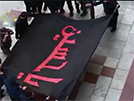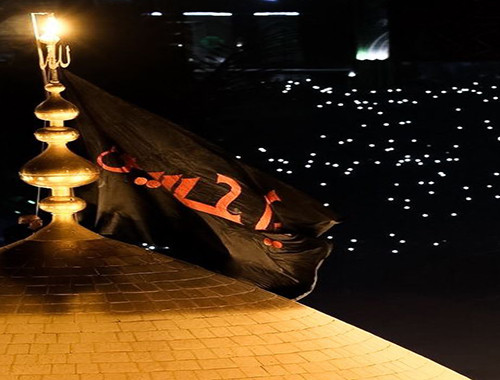Verses 1-5
- Details
- Hits: 2802
Sura Lahab
(The Flame)
No. 111 (Verses 1-5)
بسم الله الرحمن الرحيم
(1)تَبَّتْ يَدَا أَبِي لَهَبٍ وَتَبَّ
(2)مَاأَغْنَى عَنْهُ مَالُهُ وَمَا كَسَبَ
(3) سَيَصْلَى نَارًا ذَاتَ لَهَبٍ
(4)وَامْرَأَتُهُ حَمَّالَةَ الْحَطَبِ
(5)فِي جِيدِهَا حَبْلٌ مِّن مَّسَدٍ
In The Name of Allah, The Beneficent, The Merciful
1. May the hands of Abu Lahab perish, may he (himself) perish.
2. His wealth avails him not, neither what he had earned.
3. Soon will he roast in a flaming fire,
4. And his wife, the bearer of the firewood,
5. Upon her neck a rope of twisted palm-fibre.
Commentary :
Perish the Hands of Abu Lahab!
As it was said in the 'Occasion of Revelation Of the Sura', this Sura is, indeed, an answer to the disgraceful words of Abu Lahab; the Prophet's uncle and the son of Abdul Muttalib. Among those people he was one of the strongest enemies of Islam. When he heard the clear, general invitation of the holy Messenger of Allah (p.b.u.h.) and his warning of the punishment of Allah, he said: Perdition to thee! Was it for this that thou assembled us? Then, the Holy Qur'an answers him: May the hands of Abu Lahab perish, may he (himself) perish.
terms /tab/ and /tabab/, as Raqib cites in Mufradat, mean 'the constant loss', but Tabarsi cites in Majma'-al-Bayan' that 'the meaning is a loss which leads to perdition'.
Some of the philologists have rendered it to mean 'to cut' which, perhaps, is for the reason that a constant loss naturally leads to a stop. However, from all these meanings it is concluded that it is the same meaning that was said in the verse.
Of course, this perdition may refer to this world or to the spiritual world or both of them.
Why does the Holy Qur'an, inspite of its common style, mention Abu Lahab, so strongly scorned, by name?
To make the answer of this question clear, Abu Lahab should be introduced.
Abu Lahab, i.e. the Father of the Flames, whose name was 'Abdul-'Uzza and means the servant of the idol 'Uzza, was a man of fiery temperament with a reddish face. This nickname, perhaps, was chosen for him, because, 'lahab', in Arabic, means 'a flame of fire'.
He and his wife, Umm-i-Jamil; a sister of Abu Sufyan, being specifically mentioned as the cursed ones among the enemies of Islam, hurt the holy Prophet (p.b.u.h.) very much. A person by the name of 'Tariq Muharibi' says that once Abu Labab was found going behind the holy Prophet (p.b.u.h.) passing through the marketplace called 'Zul-Mujaz'; (it is close to 'Arafat, a short distance from Mecca). He was following behind him (p.b.u.h.) shouting was a mad man and pelting his feet with stones, causing the holy Prophet (p.b.u.h.) to walk with bleeding wounds.
There are many stories of this kind narrated about the ceaseless, hideous treatment and futile statements of Abu Lahab against Prophet Mohammad (p.b.u.h.) which can be counted as reasons for why the verses, under discussion, criticize and curse him and his wife so clearly and severely.
He was the only person who did not sign the supporting agreement of Bani Hashim from the holy Prophet (p.b.u.h.) although, he took part in the agreements of the enemies of Islam, and persisted to remain his (p.b.u.h.) enemy. Regarding these facts, the reason for the exceptional case of this Sura can be made clear.
* * * *
His wealth avails him not, neither what he has earned.
It is understood from this statement that Abu Lahab was a rich, proud man who boasted about his wealth and used it against Islam.
* * * *
Soon will he roast in a flaming fire.
His punishment, as well as his name, Abu Lahab, flourished with great, blazing flames.
Not only the wealth of Abu Lahab, but, also, no wealth or social position of infidels and wrong doers avails them in rescuing them from the fire of Hell, as Sura Shu'ara, No. 29, verses 88 And 89 say: The Day whereon neither wealth nor sons will avail, But only he (will prosper) that brings to Allah a sound heart.
It is certain that the fire mentioned in the verse; Soon will he roast in a flaming fire is the fire of Hell, but some believe that it can involve the fire of this world, too.
It is narrated that after the defeat of the Meccans at Badr, Abu Lahab, who had not participated in the battle, asked Abu Sufyan, when he returned from the battlefield, about its details. Abu Sufyan described to him the event of how the Quraish were defeated and, then, he added: By Allah, we saw, in the course of battle, some riders between the earth and heaven who had come to help Mohammad.
Here, Abu Rafi', one of the servants of Abbas tells the story thus: I was sitting there and I raised my hand and said that they were the angels of Heaven. Then, Abu Lahab became so angry that he sharply struck my face and lifted me up and I fell hard upon the ground.
He continued beating me because of his grief from his disappointment. At that moment, Ummul-Fadl, Abbass' wife, who was attending there, took a stake and struck it hard on Abu Lahab's head, and said: 'Have you found this weak man alone?'.
The head of Abu Lahab became wounded and bloody. One week later he died from a contagious disease and since his body gave off an unbearable, foul smell no one approached it. It was left for three days and, at last some slaves were hired to carry it out of Mecca. They watered it from a distance and then piled stones on top of it until it was buried. (1)
* * * *
And his wife, the bearer of the firewood,
* * * *
Upon her neck a rope of twisted palm-fibre.
It is no wonder that Umm-i-Jamil, the sister of Abu Sufyan and Mu'awiyah's aunt, was Abu Lahab's wife. She was a squint-eyed woman equally bad tempered, like her husband; mischievous and grossly wicked. She cooperated with him in hostilities and hindrances against Islam. But, as to why the Qur'an describes her as 'the bearer of the firewood' several commentaries have been given.
Some have said that it is because she used to tie bundles of thorny branches with ropes of twisted palm leaf fibre, carrying them and scattering them about on dark nights along the paths, which the Prophet (p.b.u.h.) was expected to take, with the expressed intention of wounding his feet and causing him bodily injury.
Some others believe that 'the bearer of the firewood' may also be symbolic for carrying tales between people to embroil them (in the web of backbiting). This was also one of her vices.
Some commentators have said that she will carry the heavy load of the sins of others on the Day of Judgement.
The first meaning, among these commentaries, seems the most appropriate, though the combination of them all is not impossible.
The term /jid/ means 'neck and the upper part of the chest', whose plural form is /ajyad/, But, /'unuq/ means 'the back part of the neck', while /raqabah/ means 'the neck' on the whole.
The term /masad/ is a rope made of palm leaf fibre. Some have said that it is a rope with the harshness of palm fibre and the heat and heaviness of iron which will be put on her neck in Hell.
Some have also said that Umm-i-Jamil had a very precious necklace. She had sworn that she would spend it against the holy Prophet (p.b.u.h.). For this behaviour, perhaps, Allah has appointed for her such a punishment.
* * * *
Explanation:
Prophecy: A Sign of the Mircle of the Qur'an.
We know that these verses were revealed in Mecca, and it was announced that Abu Lahab and his wife will roast in the fire of Hell, i.e. they will not believe in the Truth. Finally, many pagans of Mecca believed, indeed, and some only apparently believed, but, of those who believed neither truly nor apparently were these two people.
This is one of the predictions of the Holy Qur'an that was concealed. There are some concealed facts which are discussed in a separate book under the title of 'Miracles of the Qur'an' and, in the commentary, they are referred to accordingly.
* * * *
Relationship is Not a Reason for Faith.
Abu Lahab and his wife being specifically mentioned as the cursed ones, among the enemies of Islam, is just to emphasize that no relationship whatsoever, even with the holy Prophet (p.b.u.h.), can be of any benefit when the person lacks in Faith. The men of Faith show no inclination toward those who go astray and never follow them in their wrong way, even when they are their close relatives.
Abu Lahab was the uncle of the Prophet (p.b.u.h.) but, when he did not follow the command of Allah he was blamed and warned of the divine punishment as other disbelievers are, even more than others, because, his behavior was worse than others. On the contrary, those who not only were not among the Apostle's relatives but, also were from other countries even with different races and languages, but, believed and parcticed with their true Faith, were so close to the Prophet of Islam (p.b.u.h.) that, for example, according to a tradition, the apostle said about Salman-Farsi: Salman is of our Ahlul-Bait. It was as if he were one of the family members of the Prophet (p.b.u.h.).
It is true that this Sura is about Abu Lahab and his wife, but it is clear that they are cursed because of their behaviour and thoughts, and hence, every individual or group of people who possesses their qualities will have the same destiny as theirs.
* * * *
Supplication:
O Lord! Clear our hearts from any grudge.
O Lord! We are all afraid of the final result. Give us security and ease and arrange our destiny in a good condition.
O Lord! We know that in that Great Court neither wealth nor relationship will avail us but by Your Grace.
(1) Bihar-al-Anwar, vol. 19, p. 227.
The End of Sura Lahab
(The Flame)

